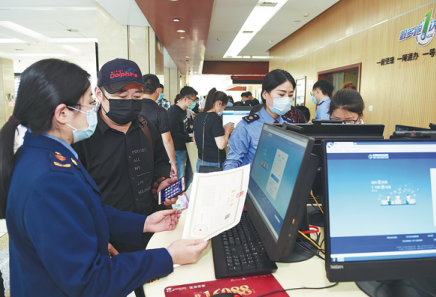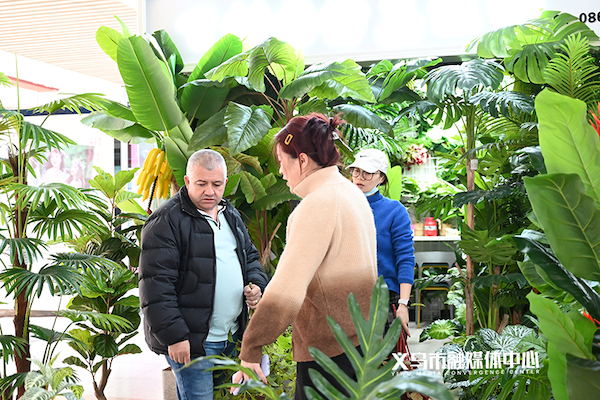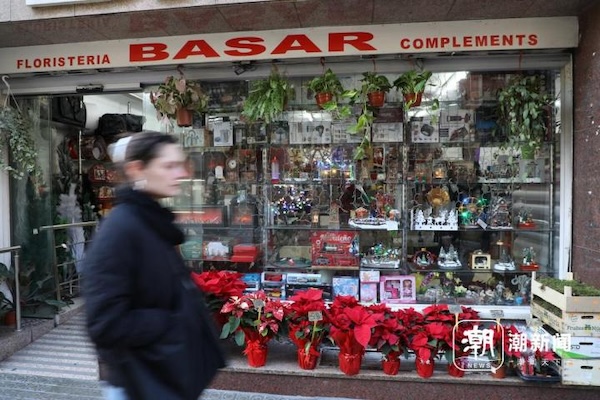Small commodities hub presses on with photovoltaic, digital development

Government staff members help business representatives apply for business licenses online in Yiwu. [Photo provided to chinadaily.com.cn]
Yiwu, East China's Zhejiang province, is taking significant action to offset the impact of the novel coronavirus outbreak to its economy and write a new chapter of high-quality development.
Based on the city's overall plan, the annual economic targets of Yiwu in 2020 remain unchanged, and 60 percent of its annual investment should be completed in the first half of this year.
In recent years, Yiwu has been a leader in developing the local economy. Its construction projects serve as the carrier to expand its investment. The city now has 357 key projects in progress.
Yiwu started from scratch to develop the photovoltaic industry, which has achieved favorable results. The industry generated an output value of 5.6 billion yuan ($786.21 million) last year. That amount is expected to reach more than 15 billion yuan this year, according to the local government.
Jinko Solar, a solar power energy company, recently invested 11 billion yuan in Yiwu. The first phase of the project went into operation this month.
With a total investment of 10.2 billion yuan, JA Solar, another bigname company, also engaged in Yiwu's solar power industry. It completed an online contract signing with the city and the project began construction this month.
After investing a total of 6 billion yuan, Trina Solar has also seen its project set up in the city. Trina's project has been under construction since last June.
Risen Energy invested 2 billion yuan in Yiwu to develop a solar project, the construction of which was completed at the end of 2019. The project reached an output value of 420 million yuan in the first quarter of 2020.
Yiwu's efforts made in both normalizing epidemic prevention and control and promoting economic and social development have achieved initial successes.
From January to April this year, the output value achieved by Yiwu's industrial enterprises above designated scale-with an annual sales revenue surpassing 20 million yuan-is 16.67 billion yuan.
The output value and sales value of the city's industrial enterprises increased by 8.3 percent and 0.9 percent in April, according to the local government.
In addition, Yiwu attaches great importance to expanding overseas markets and developing the digital economy in hopes of forging new drivers of economic growth.
The global coronavirus outbreak has led to a sharp decline in demand. Yiwu has seen some of its foreign orders delayed or canceled.
To cope with the situation, the city is making use of its existing overseas warehouses and exhibition halls to allow foreign buyers to see samples and purchase commodities directly.
Yiwu has already shipped 10,000 stock-keeping units of goods so far this year to its warehouses in the Czech Republic, Dubai and Rwanda.
The city is scheduled to establish seven more exhibition halls in countries including Germany, Japan, Spain, South Korea and Dubai this year.
With the development of big data, artificial intelligence and 5G technologies, Yiwu is pressing ahead with the digital reform of trade modes.
On March 25, the Yiwu Comprehensive Bonded Zone was approved by the State Council.
Joining hands with China's e-commerce giant Alibaba, Yiwu is poised to forge a comprehensive bonded zone featuring digital trade. The digitalization is expected to be realized in multiple processes in the bonded zone, including production, trade, logistics and supervision.
Yiwu is also speeding up its efforts to establish digital hubs of the electronic World Trade Platform. The eWTP is an initiative proposed by Alibaba to facilitate cross-border trade for small businesses.
After collaborating with Rwanda and Ethiopia, Yiwu is scheduled to establish three more eWTP digital hubs by the end of this year, aiming to cover more international trade and build a global "digital silk road", according to the local government.

 Artificial flowers: Yiwu's evergreen business
Artificial flowers: Yiwu's evergreen business Yiwu Intl Trade Market reopens after Spring Festival holiday
Yiwu Intl Trade Market reopens after Spring Festival holiday Yiwu products becoming global lifestyle staple
Yiwu products becoming global lifestyle staple